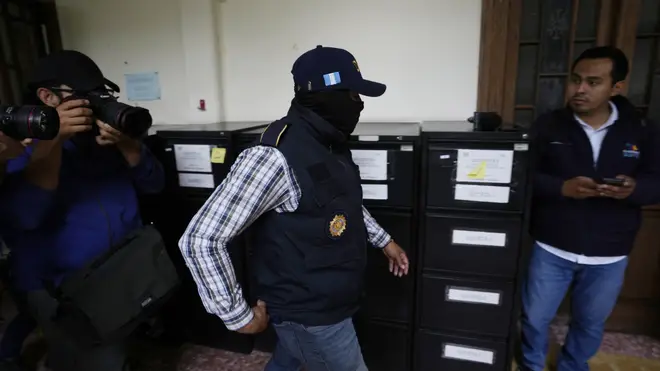
Simon Marks 4pm - 7pm
13 July 2023, 17:34

A raid was also expected to take place at the progressive Seed Movement’s party headquarters.
The Guatemalan Attorney General’s office raided the headquarters of the country’s electoral authority just hours after it certified the results of the country’s June 25 election, sending the country deeper into political turmoil.
The Thursday morning raid appeared to be connected to prosecutors’ attempt to keep progressive candidate Bernardo Arevalo from competing in a runoff election on August 20.
On Wednesday, the Attorney General’s office announced that a judge had suspended the legal status of Mr Arevalo’s Seed Movement party, for alleged violations when it gathered the necessary signatures to form.

Supreme Electoral Tribunal spokesman David de Leon confirmed the raid. The Attorney General’s office said its purpose was to search and seize evidence from voter rolls. A raid was also expected to take place at the Seed Movement’s party headquarters on Thursday.
Mr Arevalo was a surprise winner in the June 25 election. In the days before the vote, the former diplomat and academic had polled below 3% and was not among the top six or seven candidates, all of whom were considered to be on the conservative end of the political spectrum.
No candidate came close to exceeding the 50% threshold necessary to win outright in the first round of voting, necessitating the August runoff.
Mr Arevalo has framed himself as the candidate who would bring change to the country, versus his opponent, former first lady Sandra Torres, who he said would maintain the status quo.
Ms Torres, who won the most votes in the first round, belongs to the UNE party that dominates the Guatemalan Congress, and was a key ally in helping President Alejandro Giammattei pass his legislative agenda.
Mr Arevalo also promised to bring back prosecutors and judges who were critical to the nation’s fight against corruption but were forced out of the country under Mr Giammattei’s administration.

As the wait continued for certification of the election, anxiety grew that the government was looking for a way to change the results.
Several losing parties waged a legal challenge, leading Guatemala’s highest court to suspend the certification and order a review of hundreds of challenged polling place tallies. The review concluded with no change in the results.
Then late on Wednesday, Rafael Curruchiche, the special prosecutor against impunity, announced that a judge had granted his request to suspend the Seed Movement for allegedly violating the law while gathering signatures it needed to establish the party.
But Mr Currichiche’s action, in turn, violates Guatemala’s election laws, which prohibit suspending parties during an election. The move prompted vehement objections from across the country’s political spectrum and from abroad.
The US State Department had already accused Mr Curruchiche and his boss, Attorney General Consuelo Porras, of being undemocratic actors for obstructing corruption investigations in Guatemala.
“We are deeply concerned by new threats to Guatemala’s electoral democracy,” Brian Nichols, the US assistant secretary for Western Hemisphere affairs, said via Twitter on Wednesday night.
“Institutions must respect the will of voters.”